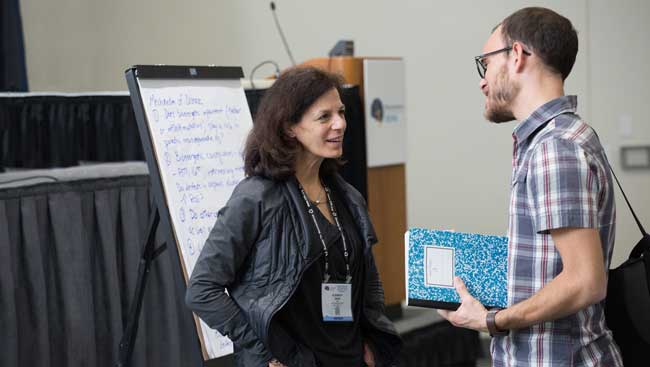Answers to 6 Sensitive Peer Review Questions
- Featured in:
- Publishing and Peer Review

Do you have questions about how to thoughtfully respond to reviews you may not agree with, making recommendations to editors as a reviewer, and other topics related to the peer review process?
Get answers in the Q&A below with Margaret McCarthy, eNeuro advisory board member and professor of pharmacology and chair of the department of pharmacology at the University of Maryland School of Medicine. Also be sure to listen to SfN’s podcast, The Perils of Publishing.
How do you bring up criticisms in a constructive manner?
Don't make demands, criticisms, or insults. Also, a lot of times, people are emboldened by being anonymous, but it’s important to remain respectable and constructive. Posing your critique in the context of questions and suggestions is a good approach.
When making a recommendation for editors, how should reviewers weigh novelty, insight, diligence, and methods?
You should weigh them all, and probably in that order. Novelty is important, but it’s not everything. Sometimes very solid work advances a field by filling in missing gaps, but it is not particularly novel. Insight is a new connection. It's not quite novelty, but maybe you put things together in a new and important way. Diligence refers to the rigor of the work, which must be of high rigor, and by high rigor we mean sound experimental design with appropriate controls etc., in addition to appropriate reporting of the essential details needed for replication. Sometimes we demand higher rigor in areas that are novel, because they are pushing the boundaries of the field and we want to have confidence that the observations are well-grounded and not spurious.
It is harder for junior scientists to evaluate for novelty and insights because they're still learning the field and the larger context. It's appropriate for them to say to the editor, "I don't have a full historical context in which to place this work, but I find it particularly exciting and new." Or, "I don't understand what all the fuss is about. I don't see why this is exciting and new." If that's the case, then the authors haven't sold you, and that's important. It is beholden to the authors to tell you why this is important new work.
Should a first review as a trainee be done under supervision? Can they share the manuscript with their supervisor or mentor without breaking confidentiality?
Absolutely. They can — and should — do that. Now, many journals, including eNeuro, will ask the reviewer, "Did you co-review this with anybody else, and if so, could you please provide their names?" because then there is somebody who can be entered into the reviewer database. For transparency and fairness, you should always give the names of anybody with whom you co-reviewed the manuscript.
How can junior investigators survive the peer review process while avoiding doing burdensome or unreasonable requests, such as demands for additional experiments?
One of the reasons we held a webinar, Tricks of the Trade: How to Peer Review a Manuscript, was to show that reviewers are not all-knowing, nor can they tell you to do everything that they think that you should do. You can reasonably push back and say, "Yes, that's an interesting experiment, but it's beyond the scope of the current study," or "No, actually, I think you misinterpreted what we were trying to show" and give another explanation.
This is my best advice: Don't fight with your reviewers. You need to respond to them, but don't argue with them. You will lose the argument. Instead, respond thoughtfully and carefully.
When you first get your review back, you might be really angry, particularly when you get your grant reviews back. You should always read it, set it aside for a couple of days, read it again when you feel a little calmer, and then you might think, "Oh, I didn't really get what they were saying there. Now I understand. That's actually a good point. I hadn't thought of it." You might find that in the end, your manuscript will be even better.
When should you say no to a request to review?
Most importantly, when you have no expertise in the area. Sometimes editors make mistakes. They think you have expertise that you don't. If you don't have expertise, say no. Don't say to yourself, "I'll learn how to do it while I'm reviewing the paper." If you have recently published with or are currently collaborating with one or more of the authors, you shouldn't be reviewing. You then have a conflict of interests in that review process.
How does it help the reviewers to be blind to the authors?
It helps a lot, because you aren't biased about names of the institution, country of origin, and power of the senior author’s name. You'd be surprised how much implicit bias will creep into your review when you know all of those things. The more you review, the more you'll realize that it does impact you. To be freed from that is very useful.
Adapted from SfN’s webinar, Tricks of the Trade: How to Peer Review a Manuscript, which is available for all members to watch on-demand.
Speaker











